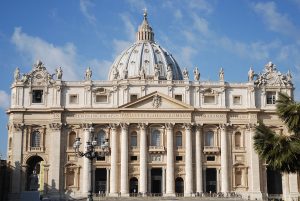On Saturday, the liturgical memorial of St Augustine, Pope Francis approved transitory Norms for the Chapter of St Peter’s Basilica in the Vatican, reported Vatican News. The new norms will come into force on October 1. The goal is to support the start of the reform of this ancient institution, whose Statutes are currently being revised. In particular, the aim is to revitalize the “service of liturgical activity and pastoral care” carried out by the canons in the Vatican Basilica mainly on Sundays and holy days.
The new norms
According to the new norms, the canons – just under 30 in number – will receive “a capitular emolument that cannot be accumulated with other commissions or other remuneration for services rendered in the Roman Curia and in other institutions connected with the Holy See.” This will also be the case for the coadjutors (assistants) of the Chapter, who carry out their work in liturgical celebrations, pastoral works, and other tasks. “The administration and management of the economic activities connected with the Treasury Museum and the sale of religious objects” will be entrusted to the Fabbrica di San Pietro, which will also take on all the Chapter’s employees. The Chapter will continue to conserve and administer “the real estate and financial patrimony currently in existence and the related annuities”. It is also established that the emoluments of the canons and assistants in service “shall be paid by the Fabbrica.”
A thousand-year history
The Chapter of the Papal Basilica of St. Peter’s in the Vatican consists of a college of priests appointed by the Pope as canons, as well as a number of coadjutors, explained Vatican News. It has a thousand-year history: It was established as an institution in 1053 with a Bull of St Leo IX confirming a reality already present for centuries in the Constantinian Basilica, with the liturgical services carried out by monks belonging to various monasteries. Beginning with the pontificate of Pope Eugene IV (1145-1153), the Chapter was gradually transformed into an autonomous community, passing from a monastic to a canonical structure.
Chapter commitments
From the very beginning, the Chapter’s activities encompassed various fields: from liturgy to the administrative management of the patrimony of the Basilica and its subsidiary churches; from pastoral activity, with the care of the Borgo district, to charitable work, with various welfare services. From the 16th century, when construction of the new Basilica began, the history of the Chapter was intertwined with that of the Fabbrica di San Pietro, two separate institutions that are nonetheless united in the person of the archpriest.
Rediscovering the ministry of prayer
In recent decades – as Benedict XVI pointed out when he met the canons on October 7, 2007 – “the Chapter’s work in the life of the Vatican Basilica […] has sought more and more to rediscover its true, original function that consisted above all in the ministry of prayer.”
This, he said, “is the proper nature of the Vatican Chapter and the contribution that the Pope expects of you: to recall with your prayerful presence at Peter’s tomb that nothing can come before God; that the Church is entirely oriented to Him and to His glory; that the primacy of Peter is at the service of the unity of the Church, and that this, in turn, is at the service of the saving plan of the Most Holy Trinity.”
The current reform is part of this path.










